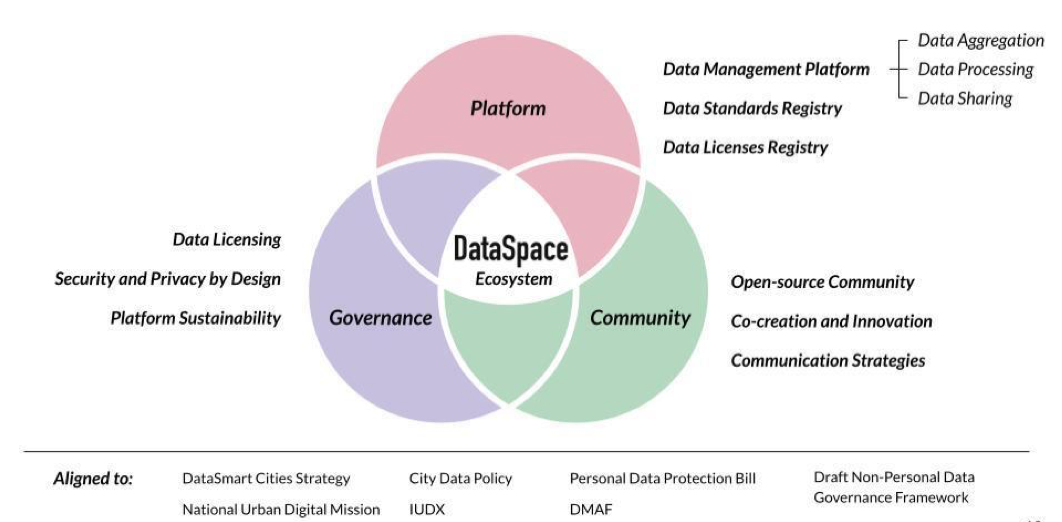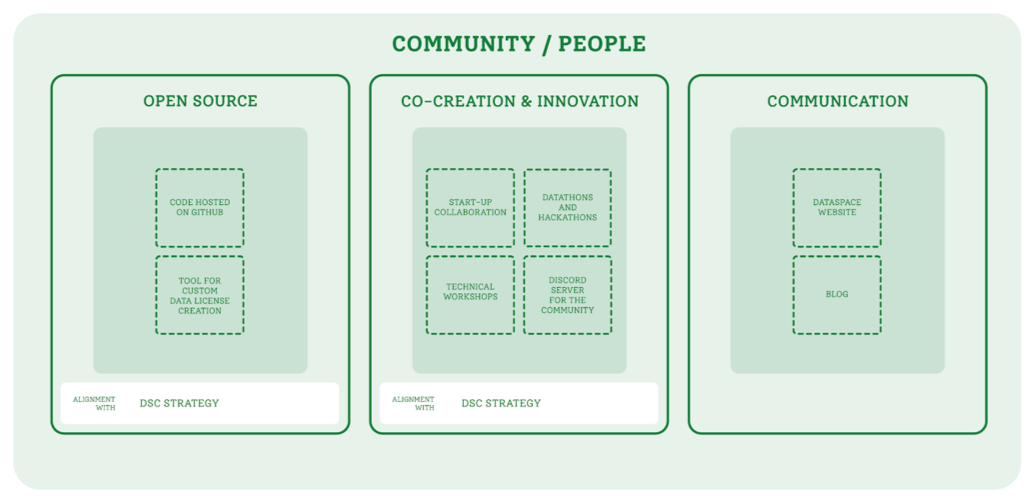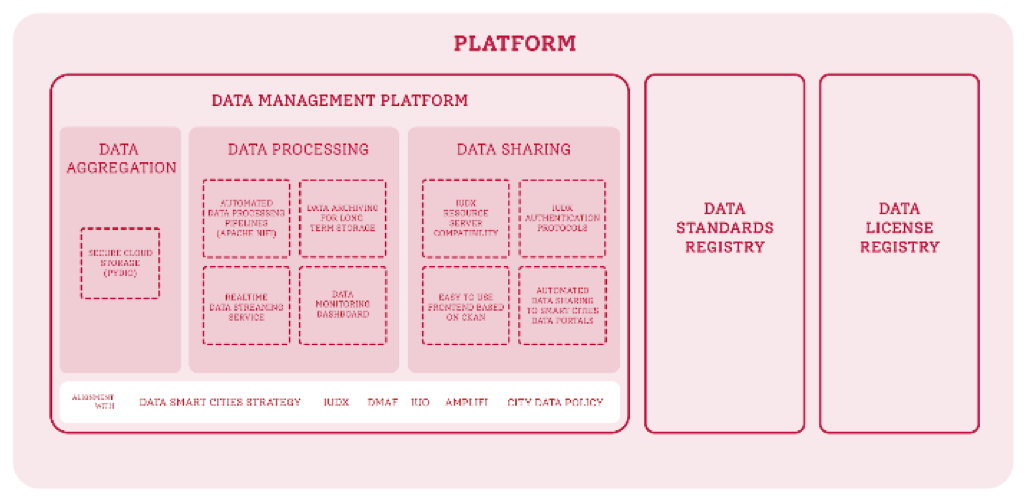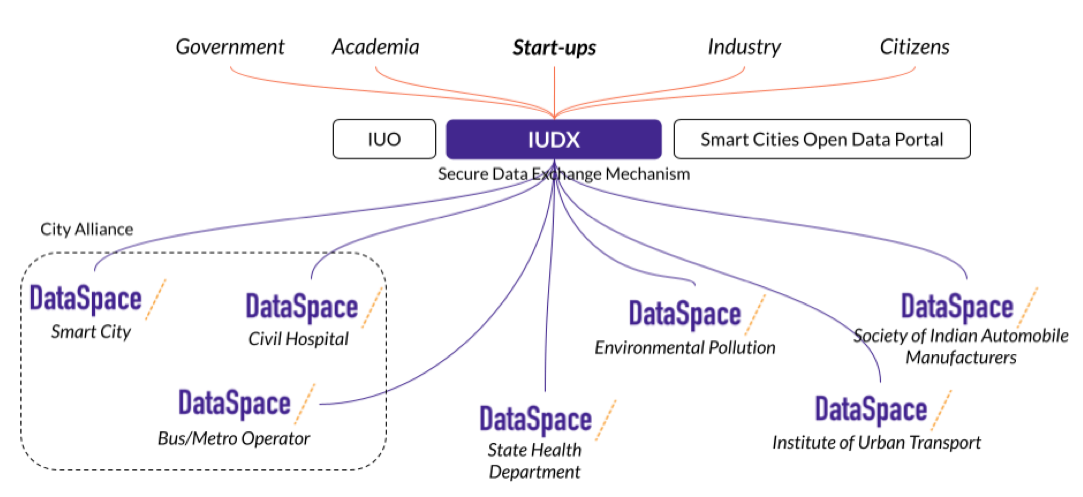Sectoral Data Management Tech. Stack at city-level enabling democratic sharing of standardized, high quality urban data among the quadruple helix.
MOBILIZE
Context
With the deployment of IoT (internet of things) devices, sensors, and other methods to ‘sense’ the city, the sources and size of the data generated in a city is increasing every day. Further, data and data analytics are slowly but surely becoming the backbone for problem-solving and decision-making in cities. Data is no longer considered as mere raw material for future application development but an integral ingredient needed to encourage entrepreneurship, enable innovation, and drive economic growth.
In this context, the Government of India and its various ministries have released policy documents and white papers on data governance. The Smart Cities Mission recognizes the importance of data in its ‘DataSmart Cities’ policy document (MoHUA 2019). This landmark document sounds like a clarion call to build an enabling ecosystem for innovation around data and recognizes the need to enhance engagement with stakeholders of the quadruple helix model - Government, Citizens, Academia, and Industry
Further, the domain of urban mobility in Indian cities presents numerous opportunities to pilot data-driven initiatives. Cities, as well as private companies, are in search of high-quality, standardized urban mobility data that can act as a driver for innovation, improve efficiency and increase customer satisfaction. Therefore, this project is focused on bridging the gap between supply and demand for standardized, high-quality urban-mobility-related datasets.
Problem Statement
While the Ministry of Housing and Urban Affairs (MoHUA) has made noteworthy efforts to develop national-level data sharing portals and data exchange mechanisms, like Smart Cities Open Data Portal, India Urban Observatory, AMPLIFI, and India Urban Data Exchange (IUDX), cities continue to lag in their data management capabilities.
At the city-level, data from various systems is stored in silos and often lacks harmonization that can make it interoperable across systems. Further, cities are constrained by their limited financial capacity to invest in the necessary compute and storage infrastructure to effectively handle large volumes of data.
This lack of a robust data culture in India’s urban sector acts as a constraint to the development of sound government policies, efficient service delivery, and innovation from the private sector. Therefore, this project aims to build a unified city-level DataSpace that enables democratic sharing of standardized, high-quality data among various stakeholders in the quadruple helix model. Further, through sustained dialogue and collaboration with these stakeholders, the project hopes to incentivize a “culture of data” within the urban sector.
To effectively implement a pilot DataSpace in the short duration of the Fellowship Programme as well as comprehensively delve into a single domain, the project scope was narrowed down to one specific sector - urban mobility. Such a sector-specific approach ensures appropriate and consistent treatment of data by taking into consideration the needs of the specific sector and the types of systems generating the data.
Objective
Inspired by the DataSmart Cities Strategy and MeitY’s framework for National Open Digital Ecosystems, DataSpace rests on three key pillars - Data Delivery Platform, Governance, and Community. Together these three pillars make up the DataSpace Ecosystem, which is a set of tools that can be used to develop sector-specific and city-specific DataSpaces in the future. As a result, the project is envisioned in a manner that is modular, decentralized, replicable, and scalable.
- Based on the initial ideation of the project, the following objectives were proposed:
- Develop a public digital infrastructure that acts as a data delivery platform as well as provide additional services based on the available data
- Adopt comprehensive domain-specific data standards for urban mobility in line with national guidelines and international best practices
- Identify a suitable governance framework for the platform with clearly defined rules and accountable institutions.
- Engage with various stakeholders from the government, public and private sector to develop a vibrant community that adds value to the digital platform and its services
- Build a self-sustaining financial model to fund the development of the platform over the long term.
Project Strategy
Pilot City Identification
As a part of the pilot city identification strategy, the following essential criteria were utilized and various smart cities were analyzed to select a suitable Smart City for the project.
- Presence of a large and diverse mobility ecosystem
- Availability of data and high level of data maturity
- Vibrant startup community interested in urban mobility
- Based on these critical parameters, Faridabad Smart City Ltd (FSCL) was approached to pilot the project.
Due to its connectivity to the larger Delhi National Capital Region, Faridabad provides a diverse platter of mobility stakeholders in public transit (DMRC, DTC, e-rickshaws), shared mobility, urban freight, electric mobility, and even hi-tech ventures with drones and V2X technologies. Due to this diversity, the team believed that capturing even a small fraction of the mobility ecosystem in the pilot project would provide enormous value to potential data consumers and set the stage for future expansion. Moreover, the urban mobility data with the various stakeholders in Delhi was digitized and available in machine-readable formats. Delhi Transport Corporation is presently one of three public transit agencies in India that streams real-time open data in international transit standard-GTFS format.
Project Development and Implementation

Expected Outcomes
The potential of the project was immense as a consequence of its capacity for scaling up and replication. The deliverables for the project are as follows:
- A robust data delivery platform that enables democratic sharing of high-quality, standardized datasets on urban mobility.
- Assuring data privacy and security by design for all the datasets on the platform.
- Creation of a repository of domain-specific standards for urban mobility suited to the Indian context.
- Encoding a suitable governance framework within the platform that clearly defines the rules of engagement of various stakeholders, privacy, security, and data licensing.
- Formal collaborations with various private organizations, start-ups, and research organizations to share and obtain valuable datasets.
- Develop key performance metrics that can be used to effectively monitor the working of the data delivery platform, its governance, and community engagement.
- Develop a long-term, self-reliant financial model to sustain the platform post the 2020 India Smart Cities Fellowship Programme.
Development of a long-term, self-reliant financial model to sustain the platform post the 2020 India Smart Cities Fellowship Programme.
Actual Result
The achievements of the project can be noted in terms of its three foundational pillars.


Governance: In terms of governance, the project explored diverse aspects of data licensing, security and privacy by design along with opportunities to ensure platform sustainability in the long term.

Community: The wider community was engaged throughout the project duration and in a variety of ways. The open-source software development community was engaged through the online platform, Github. Here, diverse individual contributors were able to review open issues concerning the code and voluntarily contribute to the development of DataSpace tools. Start-ups and private companies currently operating in the urban mobility domain were engaged to explore opportunities for use case development with the help of the datasets onboarded to DataSpace in Faridabad. As the technology partner for the Smart Move Challenge, the project was able to reach a wide audience of professionals, researchers, and students across the world.

Platform: DataSpace is a complete technology stack formed by a variety of sub-products and tools that are interconnected and are dependable on each other to properly function. The principal instance of the project was independently and securely deployed at the servers of FSCL located at the ICCC, assuring that the data remains at the City’s premises and the city administrators have complete access and control over the data and technology stack. To test the working of the DataSpace technology stack, a pilot was carried out at FSCL using data from the Adaptive Traffic Control System (ATCS). Based on this process, four data products were made available at FSCL - GIS-based maps, static dataset, real-time data stream, and an archived dataset consisting of the first three.

The decentralized deployments of the Dataspaces will be replicated at the different sectors and departments of a city and can be seamlessly connected to IUDX due to their compatible APIs and authentication protocols. Internally, the different departments will be able to exchange data for better decision making and to improve the quality of life of the citizens. The potential for data-led innovation in India is enormous, and the start-up community and local economies will flourish by the consumption of the data made available by the various City DataSpaces.
Conclusion
As a direct result of the clear definition of three foundational pillars since the conception of the project, the DataSpace Ecosystem’s future is clear and streamlined. Moreover, this allows the project to remain highly scalable, flexible, and customizable.
In short, the team proposes to further develop various sub-components of the three pillars and also replicate the DataSpace project in multiple sectors and other cities. Additionally, full integration with the Government of India’s and MoHUA’s data-related initiatives such as SmartCode, Amplifi, and IUDX are also proposed. In the long term, DataSpace is envisioned as a vibrant open-source project that draws resources from the community for its development while giving back manifold for the welfare of cities and citizens.







